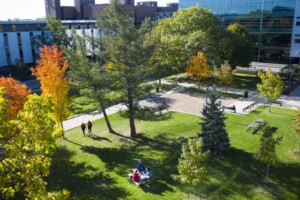BSc Program
The School of Linguistics and Language Studies offers the following BSc Linguistics programs:
- BSc Honours in Linguistics (Computer Science Stream)
- BSc Honours in Linguistics (Neuroscience Stream)
- BSc Honours in Linguistics (Psychology Stream)
- BSc Honours in Linguistics with a Concentration in Psycholinguistics and Communication Differences (Computer Science Stream)
- BSc Honours in Linguistics with a Concentration in Psycholinguistics and Communication Differences (Neuroscience Stream)
- BSc Honours in Linguistics with a Concentration in Psycholinguistics and Communication Differences (Psychology Stream)
The science requirements include math, biology, chemistry, and neuroscience or psychology.
Students in the BSc program are required at graduation to have a working knowledge of a language other than English. Proficiency is determined by successful completion of a university course in the language or by an oral or written test given by SLaLS.
Students in the BSc Linguistics program can choose to add a concentration in Psycholinguistics & Communication Differences (previously Psycholinguistics & Communication Disorders). Within the concentration, students choose a Psychology, Neuroscience, or Computer Science focus (stream). Qualified students in the Psycholinguistics & Communication Differences concentration have the opportunity to take a practicum course that provides clinical experience in speech-language pathology (information | application).
-
- Phonetics: production, perception and acoustic properties of human speech sounds
- Phonology: variations and patterns of speech sounds
- Morphology: word categories, structure and creation of words
- Syntax: structure of phrases and sentences
- Semantics: word, phrase and sentence meaning
- Historical Linguistics: language change and language relationships
- Psycholinguistics: language processing and perception, language acquisition
- Neurolinguistics: Biological foundation and neuro-cognitive mechanisms of language
- Communication Disorders: Disorders of speech, language, fluency, hearing and voice
- Research Methodology and Statistics: experimental design and data analysis
We also offer a BA in Linguistics
Our BA in Linguistics has a breadth requirement that includes courses in culture and communication, humanities, social sciences, and science, engineering and design.
Is English not your first language?
ESL students can still start a degree!
Linguistics (LING) Courses in the Undergraduate Calendar
Not all courses listed in the undergraduate calendar are offered in a given academic term.
Public Schedule: Current Course Offerings
We regularly offer special topic courses such as: Language and Landscape, Language Mapping, Language in the Legal Domain, Semantic Variation and Social Meaning, Japanese syntax, and Linguistic and Social Aspects of Inuktitut. The public schedule displays current course offerings.
Frequently Asked Questions (FAQ)
If you have any questions, check our FAQ and contact the undergraduate advisor.
Other Helpful Links

Apply Today!
Learn more about applying to Carleton University.

Student Life in SLaLS
Sift through current student forms and resources, meet your student groups, and discover opportunities on- and off-campus!

